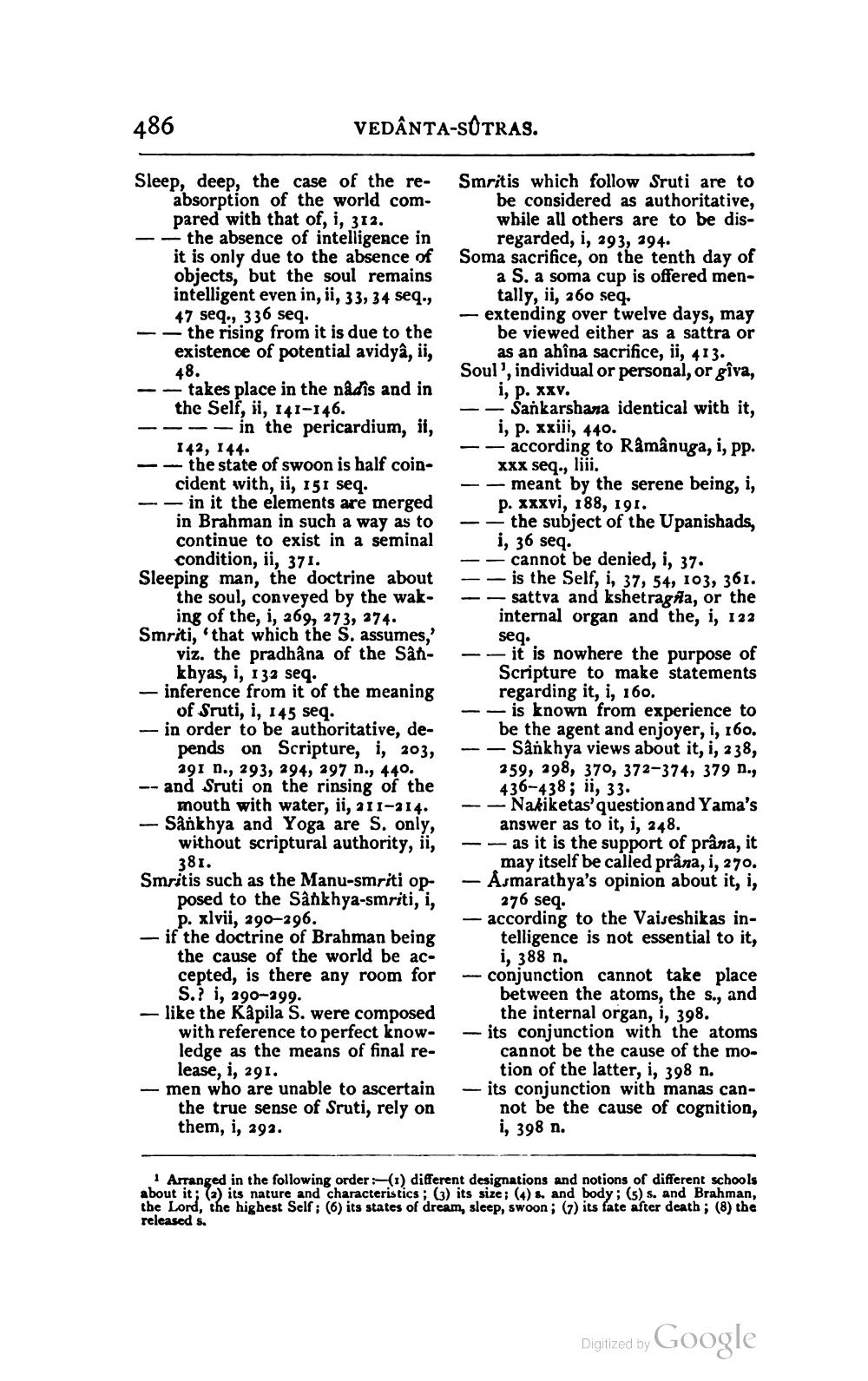________________
486
VEDÂNTA-SOTRAS.
Sleep, deep, the case of the re-
absorption of the world compared with that of, i, 312. - the absence of intelligence in it is only due to the absence of objects, but the soul remains intelligent even in, ii, 33, 34 seq., 47 seq., 336 seq. - the rising from it is due to the existence of potential avidya, ii,
48.
- takes place in the nådis and in the Self, ii, 141-146. - - - in the pericardium, ii,
142, 144. - the state of swoon is half coin
cident with, ii, 151 seq. - - in it the elements are merged
in Brahman in such a way as to continue to exist in a seminal
condition, ii, 371. Sleeping man, the doctrine about
the soul, conveyed by the wak
ing of the, i, 269, 273, 274. Smriti, 'that which the S. assumes,'
viz. the pradhana of the Sân
khyas, i, 132 seq. - inference from it of the meaning
of Sruti, i, 145 seq. - in order to be authoritative, de
pends on Scripture, i, 203,
291 D., 293, 294, 297 n., 440. -- and Sruti on the rinsing of the
mouth with water, ii, 211-214. - Sankhya and Yoga are S. only,
without scriptural authority, ii,
Smritis which follow Sruti are to
be considered as authoritative, wbile all others are to be dis
regarded, i, 293, 294. Soma sacrifice, on the tenth day of
a S. a soma cup is offered men
tally, ii, 260 seq. - extending over twelve days, may
be viewed either as a sattra or
as an ahîna sacrifice, ii, 413. Soul', individual or personal, or giva,
i, p. xxv. -- Sankarshana identical with it,
i, p. xxiii, 440. -- according to Râmânuga, i, pp.
XXX seq., liii. - meant by the serene being, i,
p. xxxvi, 188, 191. - the subject of the Upanishads,
i, 36 seq. -- cannot be denied, i, 37.
is the Self, i, 37, 54, 103, 361. - sattva and kshetragña, or the internal organ and the, i, 122 seg. - it is nowhere the purpose of Scripture to make statements
regarding it, i, 160. -- is known from experience to
be the agent and enjoyer, i, 160. - Sankhya views about it, i, 238, 359, 298, 370, 372–374, 379 n., 436-438 ; ii, 33. -Nakiketas' question and Yama's
answer as to it, i, 248. - as it is the support of prâna, it
may itself be called prâna, i, 270. Asmarathya's opinion about it, i,
276 seq. - according to the Vaiseshikas in
telligence is not essential to it,
i, 388 n. - conjunction cannot take place
between the atoms, the s., and
the internal organ, i, 398. - its conjunction with the atoms
cannot be the cause of the mo
tion of the latter, i, 398 n. - its conjunction with manas can
not be the cause of cognition, i, 398 n.
Linterestertos
381.
Smritis such as the Manu-smriti op
posed to the Sankhya-smriti, i,
p. xlvii, 290-296. - if the doctrine of Brahman being
the cause of the world be accepted, is there any room for
S.? i, 290-299. - like the Kapila S. were composed
with reference to perfect knowledge as the means of final re-
lease, i, 291, - men who are unable to ascertain
the true sense of Sruti, rely on them, i, 292.
not
1 Arranged in the following order: 1) different designations and notions of different schools about it; (2) its nature and characteristics; g) its size; (4) s. and body ; (5) s. and Brahman, the Lord, the highest Self ; (6) its states of dream, sleep, swoon; (7) its fate after death; (8) the released s.
Digitized by
Digized by Google




